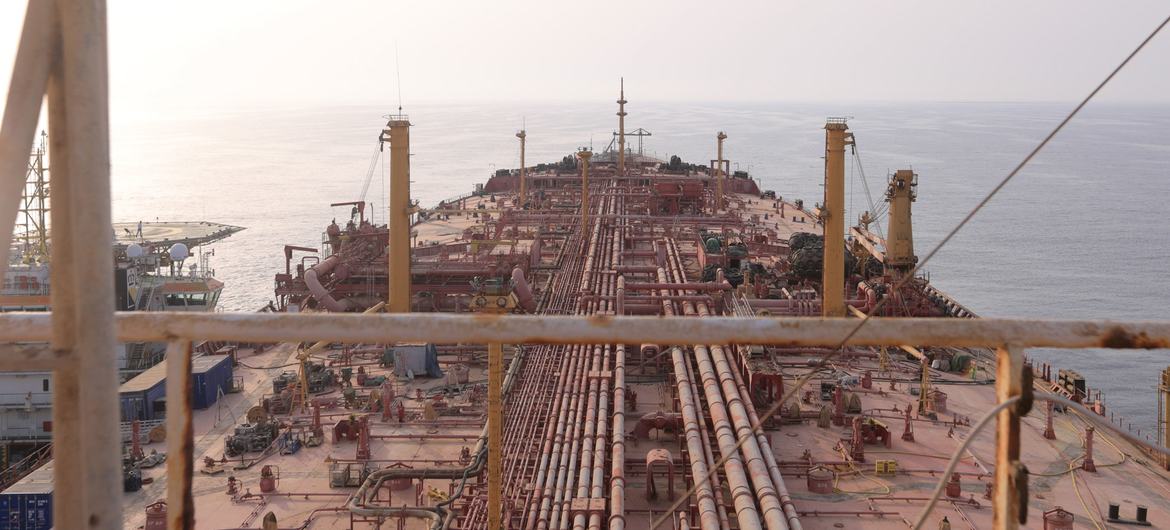The United Nations has raised around $121 million to begin operations of removing the oil off the ship it calls a “time bomb.”
Qatar has welcomed the start of unloading operations for the deteriorating floating storage and offloading (FSO) facility in the Red Sea, which is being carried out by the United Nations.
On Tuesday, the UN initiated the process of transferring one million barrels of oil from the 47-year-old supertanker located off the coast of conflict-ridden Yemen.
Approximately 1.13 million barrels of crude oil have now been taken from the FSO Safer to another tanker called the ‘Yemen’.
Qatar’s ministry of foreign affairs conveyed Doha’s gratitude towards the UN and its international partners for their efforts in tackling the issue of the ship, which is holding 1.1 million barrels of oil, four times the amount of the Exxon Valdez – enough to make it the fifth largest oil spill from a tanker in history.
The ministry proudly acknowledged Doha’s own contribution in supporting the coordinated rescue endeavours in line of preventing a catastrophic oil spill.
In May 2022, Qatar pledged a $2 million donation to the combat the threat posed by the floating oil tanker Safer off Yemen’s coast.
“The United Nations has begun an operation to defuse what might be the world’s largest ticking time bomb. This is an all-hands-on-deck mission and the culmination of nearly two years of political groundwork, fundraising and project development” said UN Secretary-General Antonio Guterres.
The ship might disintegrate or explode at any time, according to international authorities, wreaking havoc on the countries and marine life along the Red Sea, as well as worldwide supply chains that rely on transiting those seas. A spill would likely “wipe out 200,000 livelihoods instantly” and “fish stock would take twenty five years to recover,” UN spokesperson Sarah Bel said.
She referred to the operation as unprecedented, emphasised the need for caution during this critical “emergency phase.” However, she reassured reporters in Geneva on Tuesday that all necessary measures had been meticulously arranged to ensure a successful outcome.
The UN has raised approximately $121 million to begin operations of removing the oil off the ship it calls a “time bomb.”
Qatar reaffirmed its complete readiness to aid all global initiatives that strive to create a safer and more sustainable future for everyone, it said in the statement.
The years-long conflict in Yemen had halted the production, offloading, and maintenance activities of the tanker, the UN said.
However, the global bloc engaged in negotiations with the conflicting parties in Yemen to reach an agreement and establish a framework for the retrieval of the oil from the tanker.
Through a crowdfunding effort, a total of $121 million was raised from 23 Member States, the European Union, the private sector, and the public. The UN’s humanitarian agency, OCHA, provided bridge funding, but there is still a need for approximately $20 million, UN said.
The pumping operations are being conducted by the salvage company, SMIT, with the involvement of numerous other experts such as maritime oil spill experts, maritime lawyers, insurance brokers, and shipbrokers.
To mitigate the risk of explosion, a chemist is continuously monitoring the gas levels in the pumped tanks.
For over three decades, the FSO Safer has been anchored approximately 4.8 nautical miles southwest of Yemen’s west coast, near the Ras Issa peninsula. The Houthi rebels control the area where the tanker is anchored and the national oil company that owns it had inked a pact with the UN in early March 2022 to deal with it.
In 2015, the tanker’s production and maintenance ceased because of the eight-year-long conflict involving a pro-government Saudi-led coalition and the rebels. As a consequence, the vessel has now deteriorated beyond any possibility of repair.
The UN chief cautioned that the expenses for the cleanup process alone would amount to $20 billion and voiced concerns that shipping routes, including the Suez Canal, could face disruptions lasting for several weeks.
Separately, there have been talks with both sides in Yemen, according to UNDP Administrator Achim Steiner, regarding the potential sale of the oil, which appears to be a possibility in the near future.
Samples have already been dispatched for laboratory testing, and a qualitative evaluation is anticipated in the coming days.
The conflict in Yemen began in 2014 when the Iran-backed Houthi rebels took control of the capital, Sanaa. The following year, a Saudi-led coalition intervened at the request of the internationally recognised government, triggering the worst humanitarian crisis in the world and internally displacing 4.5 million people.
In April, Saudi and Omani delegations held talks with Houthi rebel officials in the capital Sanaa as part of global efforts to bring an end to Yemen’s nine-year conflict.







